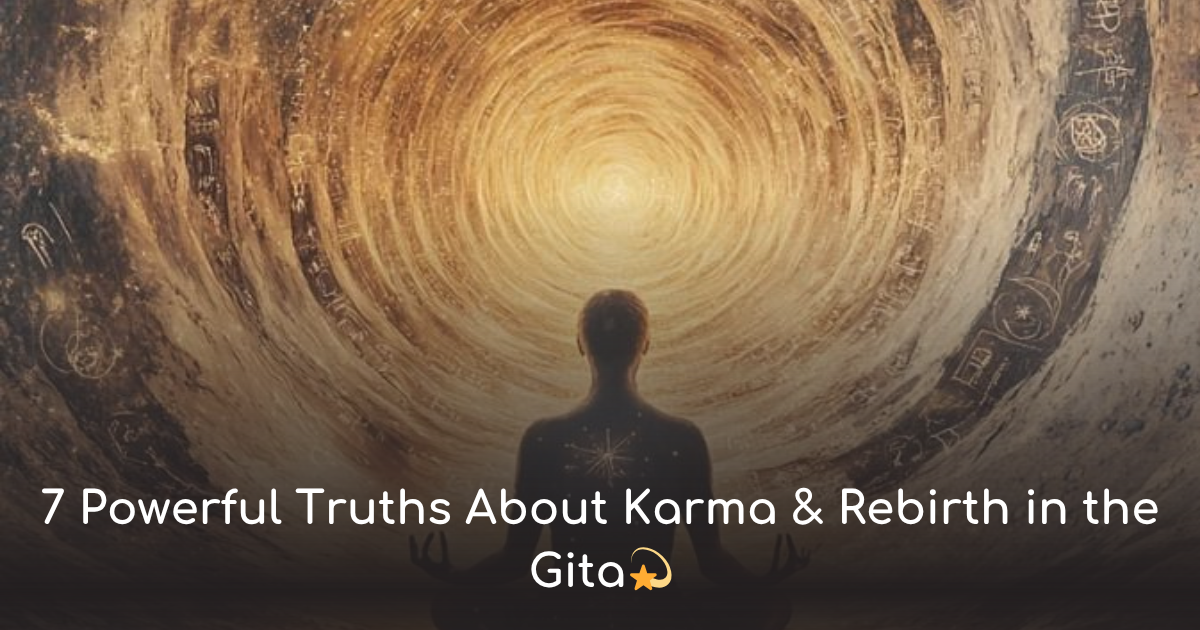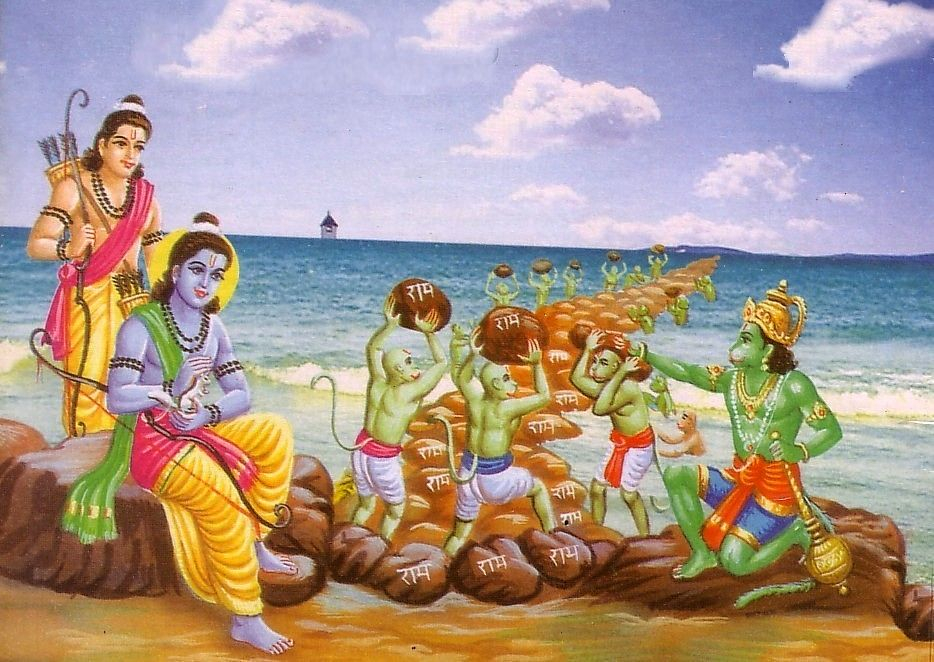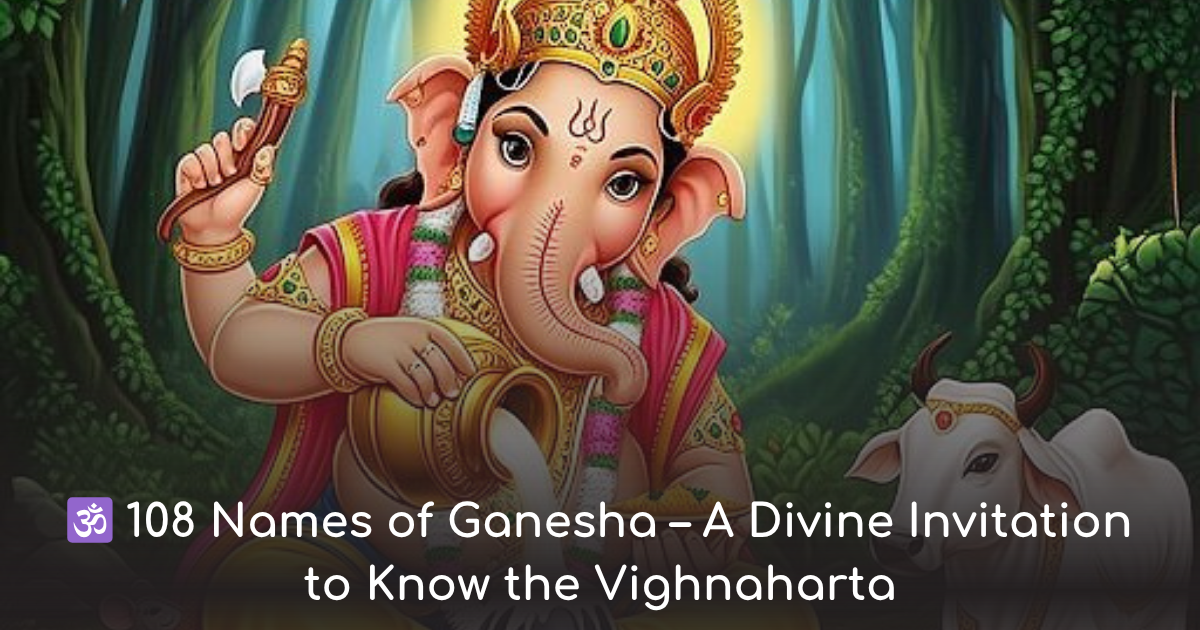7 powerful truths about karma & rebirth in the gita

karma and rebirth bhagavad gita: Discover 7 divine truths that reveal your soul’s journey and how to shape your next life through righteous action. 🌿
🕉️ Introduction: karma and rebirth bhagavad gita – The Cycle Explained
“karma and rebirth bhagavad gita” — these sacred words open the door to one of life’s most profound mysteries: What happens after death? Is there truly another life? And if so… who decides what that life will be?
Dear reader, pause for a moment and reflect…
🔸 Why are some born into privilege and others into pain?
🔸 Why do some souls find peace early, while others struggle for lifetimes?
🔸 Could your present life be the result of past actions — and your future life be written by your choices now?
The Bhagavad Gita, Sanatan Dharma’s timeless scripture, doesn’t merely hint — it clearly reveals that your Karma determines your next birth, and that your soul never dies — it only transitions, evolves, or repeats... based on your inner and outer actions.
Let us now explore the 7 Powerful Truths Gita Reveals About Karma & Rebirth, beginning with the most foundational one — your immortality.
💫 Truth #1 – The Soul Never Dies, It Only Transitions 🔁
Gita 2.20
"Na jāyate mriyate vā kadācin nāyaṁ bhūtvā bhavitā vā na bhūyaḥ..."
“The soul is never born, and it never dies. It is unborn, eternal, ever-existing, and primeval. It is not slain when the body is slain.”
✨ Interpretation:
Your body may age and decay, but you are not the body. You are the eternal Atman — untouched by time, fire, water, or death. In the Bhagavad Gita, Lord Krishna declares that the soul is imperishable — it only changes its outer garment.
🧥 Just like we discard old clothes and wear new ones, the soul discards one body and takes another, based on Karma.
📿 Sanatan Analogy:
Imagine the soul as a traveler and each life as a hotel stay. When the purpose is complete or conditions deteriorate, the traveler checks out — only to move on to the next destination.
🛕 Your soul is not bound to one birth. You are in a vast journey of consciousness.
🔄 Application:
-
Stop identifying only with this one lifetime — broaden your view.
-
Understand that every action now echoes beyond this birth.
-
Realize that those who’ve departed haven’t ended — they’ve just transitioned.
🪷 Real-Life Connection:
When a loved one dies, Gita’s teachings bring peace. Lord Krishna teaches Arjuna, “You grieve for those who should not be grieved for. The wise lament neither for the living nor the dead.” Because they know — the soul continues.
🌱 Truth #2 – Your Karma Decides Your Next Birth
Gita 8.6
“Whatever one remembers at the time of death, that state he attains without fail.”
This verse isn’t about the final moment alone. It's about the culmination of your life’s thoughts and karmas. Krishna is clear — your future birth depends on your inner state and actions in this life.
✨ Interpretation:
What you habitually think, what you crave, what you run behind — all of these form a deep samskara (mental impression). At death, these samskaras project your consciousness into the next birth.
💭 If your life is filled with greed, your rebirth may align with that craving. If you live with compassion, you may rise into higher realms. You become what you constantly dwell upon.
🔥 Karma + Thought = Rebirth Equation
| Karma | Thought Pattern | Possible Outcome |
|---|---|---|
| Service | Gratitude | Higher human birth |
| Greed | Possessiveness | Lower material realms |
| Anger | Violence | Animal birth or suffering |
| Bhakti | Detachment | Moksha or divine realms |
🧘 Personal Reflection:
Ask yourself every night:
💬 “What dominated my mind today?”
💬 “Am I living in fear, anger, or love?”
💬 “If I died tonight, where would my consciousness flow?”
This isn’t fear-mongering — it’s soul awakening.
🔗 Read Also (Recommendation):
👉 Law of Karma Explained – 7 Deep Truths About Cause & Effect
This blog beautifully complements our current topic — helping you understand how Karma works as a spiritual law, not superstition.
In the next section, we will explore what exactly happens during death according to the Gita — and how Krishna redefines death as a sacred gateway to another phase of the soul’s evolution.
If the soul is eternal… and your Karma writes your next script… then death isn’t the end.
It’s your passage forward. 🚪🌸
🚪 Truth #3 – Krishna’s Teaching: Death Is Not the End, But a Doorway
Gita 2.27
"Jātasya hi dhruvo mṛtyur dhruvaṁ janma mṛtasya ca..."
“For one who is born, death is certain; and for one who dies, rebirth is certain.”
Let that sink in.
Death is not the end. It's a law. A doorway. A sacred continuation. 🙏
According to the karma and rebirth Bhagavad Gita teachings, Krishna reveals that just as day follows night, rebirth follows death. And just as we plan for retirement, wise souls must plan for their transition — not by fear, but by conscious living.
🔍 Deep Insight:
You don’t take your wealth, status, or possessions with you. But your karma, desires, and mental state — they follow. They shape what kind of body, environment, and experiences your soul receives next.
🪔 The moment of death is simply the soul changing residence — guided by the direction of its past karmic wind.
🧘 Analogy:
Imagine the soul as a flame. When the lamp (body) breaks, the flame doesn’t die — it either merges into a larger flame (liberation), or finds another wick (rebirth), based on the fuel of Karma.
💡 Practical Takeaway:
-
Live consciously.
-
Reflect on death not as an end, but a divine checkpoint.
-
Let each action be worthy of remembrance at the final moment.
🕊️ Krishna to Arjuna:
“You grieve for the body, not the soul. The wise do not lament over death, because they see beyond form.”
🧘 This shift from fear to understanding is freedom.
🕊️ Truth #4 – Attachment Creates Rebirth, Detachment Sets You Free
Gita 3.9
"Yajñārthāt karmaṇo'nyatra loko'yaṁ karma-bandhanaḥ..."
“Work should be done as a yajna (sacrifice), otherwise it binds the soul to this world.”
Krishna reminds us — Karma becomes bondage when done with ego, desire, and expectation. But Karma becomes a path to liberation when done as an offering — selfless, detached, and pure.
🔍 The Real Trap:
It's not the world that binds you — it’s your attachment to outcomes.
-
You want success? Good. But if you need success to feel whole, you're trapped.
-
You love someone? Beautiful. But if you cling to them for identity, you're bound.
🪨 Attachment is like a rope tied to your soul — dragging it from birth to birth.
🧘 Detachment ≠ Indifference
Detachment means:
💛 Acting with full love, but not selfish expectation.
🔥 Working with passion, but not obsession for reward.
🌿 Serving others, without needing recognition.
This is true inner freedom.
📿 Gita 5.10:
"One who acts without attachment, dedicating his actions to the Supreme, remains untouched by sin – like a lotus leaf in water."
Be the lotus — active in the world, but not drowned by it. 🌸
📜 Sanatan Story – King Janaka
King Janaka ruled an entire kingdom — yet was considered a Jivanmukta (liberated while living). Why?
Because he ruled without ego. Loved without attachment. Acted without selfishness.
He treated Karma as worship — and thus, broke the cycle of rebirth even while performing worldly duties.
🪔 Truth #5 – Good Karma Can Elevate You to Higher Lokas
Gita 6.41
“After death, one who practiced Yoga but failed to attain perfection is born into a pious or spiritually wise family.”
Krishna assures Arjuna — no good Karma is ever wasted. Even if you don’t attain liberation in this birth, your efforts ensure that the next birth supports your soul’s evolution. 🌱
🌌 Lokas & Higher Realms:
| Good Karma | Likely Result | Realm |
|---|---|---|
| Selfless service | Earthly rebirth in wise family | Bhuloka |
| Devotion to God | Birth among Bhaktas | Svargaloka |
| Spiritual austerity | Entry into higher celestial plane | Tapoloka |
| Pure knowledge | Union with Divine, no rebirth | Brahmaloka or Moksha |
🔄 Karma = Spiritual Bank Account 💰
Every good deed is a deposit.
Every selfish act is a withdrawal.
At death, your balance determines your next destination.
📜 Story of Vishwamitra
He was a king who aspired to become a Rishi. Despite many falls, anger, and ego, he persisted. Eventually, through penance, Karma Yoga, and divine detachment, he attained the title of Brahmarishi — proof that karma can elevate anyone.
🔗 Read Also:
👉 Karma Stories – 7 Ancient Tales That Reveal Deep Truths
This complements today’s point with beautiful Sanatan stories of rebirth, mistakes, and redemption.
In the final part of this blog, we’ll dive into the two most liberating truths of the Gita:
-
How Nishkam Karma can end the cycle of rebirth entirely
-
How your current actions shape your next life — right now, in this very moment
You’ll also receive daily practices, real-life analogies, and spiritual techniques to live, act, and die consciously.
This is not philosophy.
It’s a path.
It’s your next step.
🔱 Truth #6 – Nishkam Karma Leads to Moksha, the End of Rebirth
Gita 4.14
“Actions do not bind Me, for I have no desire for their fruits.”
This one truth is the most liberating of all.
Lord Krishna, the embodiment of perfection, says He acts without attachment — and thus, remains free from Karma.
He is not passive — He participates in the world, but not for gain.
🧘 Nishkam Karma = Selfless Action + No Expectation
-
Act with full intensity
-
Do your duty without craving results
-
Offer all actions to the Divine
This is the secret path to Moksha — liberation from the cycle of birth and death.
🧠 Gita 3.19:
“Perform your prescribed duty, for action is better than inaction. And by acting without attachment, one attains the Supreme.”
By walking the path of Nishkam Karma, your Karma becomes pure. Pure Karma does not bind — it liberates. 🌿🕊️
📿 Real-Life Example: The Flame of Surrender
Imagine placing every action — cooking, parenting, speaking — into a sacred fire. Not for show, not for applause — but as an offering to your higher self, to Dharma, to Bhagwan.
🔥 When ego burns, only divine fragrance remains.
✨ Truth #7 – The Gita’s Message: You Can Shape Your Next Life NOW
Gita 6.5
“Elevate yourself by your own self, and do not degrade yourself. The self alone is friend and enemy of the self.”
This is empowerment from the Gita — not fear-based spirituality, but responsibility-based liberation.
🔍 Your Life Is Your Canvas
What you think, feel, speak, and do today… is the blueprint of your next life.
Karma is not just some cosmic accounting system — it is a mirror of your intention.
-
Want a peaceful rebirth? Live peacefully now.
-
Want to be born wise? Seek wisdom now.
-
Want Moksha? Walk the path of surrender now.
👉 Everything starts now.
Not at death. Not in the next life.
Now.
🧘 Practices to Shape Your Next Birth:
| Daily Practice | Purpose | Gita Reference |
|---|---|---|
| 🧘 Morning Sankalpa | Intention sets your karmic tone | 6.5 |
| 📿 Japa (chanting) | Purifies thought patterns | 8.13 |
| 🧹 Seva (selfless work) | Burns ego-based karma | 3.9 |
| 📖 Swadhyaya (scripture study) | Builds awareness & direction | 4.34 |
| 🕯️ Evening Reflection | Resets karma trajectory | 2.47 |
📜 Stories & Analogies That Illuminate These Truths
🔁 The Story of King Bharata
A noble king, deeply spiritual, but attached to a deer in old age. Due to this final attachment, he was reborn as a deer in his next life.
🌿 Moral: Your final emotional state drives your next embodiment. Attachment, even in spiritual people, binds.
🧘 The Story of Jada Bharata
As a deer, Bharata retained memory of his past life. In his next human birth, he chose silence, detachment, and deep tapasya, becoming the enlightened Jada Bharata.
🌟 Moral: Even mistakes can be corrected through deep awareness and Karma Yoga.
🧒 The Story of Nachiketa
Young Nachiketa, through fearless inquiry into death and rebirth, realized the nature of the Self and attained liberation.
📘 Found in: Kathopanishad
🕉️ Message: True knowledge of Self burns all Karma.
🔗 Blogs That You Must Explore:
🔥 Final Reflection: Break the Cycle — Live, Act, and Die Consciously
Dear reader,
You are not a victim of Karma — you are its sculptor.
You are not bound unless you choose to be.
This life is a gift — the only doorway through which Moksha is possible.
Every thought is a seed. Every act is a brushstroke on the canvas of your soul.
🕊️ Let go of fear. Embrace clarity.
✨ Live not for reward, but for liberation.
Act not for pleasure, but for purpose.
Die not in regret, but in freedom.
💌 Message for Our Readers
You are more than your current life. You are an immortal soul, guided by divine laws and the grace of Bhagwan Krishna.
May these truths from the Bhagavad Gita on Karma and Rebirth help you:
-
Live courageously
-
Act righteously
-
Detach peacefully
-
Die consciously
-
And be born no more
🌿 This is the true Sanatan path.
This is the Gita’s eternal promise.
🧾 Disclaimer
This article is based on the spiritual teachings of the Bhagavad Gita and Sanatan Dharma. Interpretations are offered to guide personal reflection and spiritual growth. For deeper scriptural study, consult traditional commentaries and Gurus.
📲 Our Social Links
🌼 If this article inspired your inner journey…
🔹 Follow Our Page for Daily Sanatan Wisdom:
👉 SanatanYug Facebook Page
🔹 Join Our Community of Seekers:
👉 SanatanYug Facebook Group
🕉️ Stay conscious.
📿 Stay karma-free.
✨ Stay blessed.
🙋♀️ FAQs – 7 Powerful Truths Gita Reveals About Karma & Rebirth
❓1. Does the Bhagavad Gita really talk about rebirth?
Answer:
Yes, the Bhagavad Gita clearly speaks of rebirth as a continuation of the soul’s journey. 🕉️ Krishna explains that the soul never dies — it simply transitions into a new form based on past Karma. This truth forms the foundation of Sanatan Dharma’s view on life, death, and liberation. 🔁
❓2. How does Karma influence my next birth?
Answer:
Your Karma is the spiritual energy you create through thoughts, actions, and intentions. 🌱 This energy carries into your next life, deciding where and how you're born. Gita teaches us to act selflessly and consciously — because your future depends on your present. ✨
❓3. What is Nishkam Karma, and why does it stop rebirth?
Answer:
Nishkam Karma means acting without any attachment to the result. 🙏 When you do your duties with love but not expectation, your Karma becomes pure. Such actions don’t bind the soul — they liberate it, helping you break free from the rebirth cycle. 🕊️
❓4. Can good Karma guarantee a better next life?
Answer:
Yes, good Karma raises your soul’s vibrations and aligns you with higher planes of existence. 🌸 Krishna says those with virtuous actions may be born into wise or divine families — giving them a head start toward liberation. 🚀
❓5. What happens at the time of death, according to the Gita?
Answer:
At death, your deepest desires and dominant thoughts project your soul into its next destination. 🧭 Gita 8.6 states that “whatever one remembers at the time of death, that he becomes.” Hence, your whole life should prepare you for that final moment. 🕯️
❓6. How can I stop the cycle of birth and death?
Answer:
By following the path of Karma Yoga, detachment, and Bhakti (devotion). 🧘 When your actions are free of ego and rooted in Dharma, you gradually purify your soul and transcend the need to be reborn again. This is Moksha. 🔱
❓7. Is being born again a punishment?
Answer:
Not at all. Rebirth is a continuation — a divine opportunity to evolve. 🌿 However, if one lives unconsciously, it may become a cycle of suffering. Gita teaches us to awaken, so we can graduate from this school of life.
❓8. How does detachment help in ending rebirth?
Answer:
Detachment means doing your best without becoming emotionally dependent on results. 💡 Such Karma becomes light and non-binding. It's like writing on water — it leaves no residue. That purity leads to spiritual freedom. 🕊️
❓9. Is liberation only for monks or yogis?
Answer:
No. Gita makes it clear that even kings like Janaka attained liberation through right action and detachment. 👑 You can live in the world and still walk the path of Moksha by doing Karma with a surrendered heart. 🙌
❓10. What is Moksha in simple words?
Answer:
Moksha means freedom from the cycle of birth and death. It’s not just a place, but a state of eternal peace and union with the Divine. ✨ A soul in Moksha is no longer bound by Karma — it rests in blissful awareness forever. 🕉️
❓11. What if I fail to live perfectly in this life?
Answer:
Don’t worry. 🙏 Krishna says even a little progress on this path saves you from great fear. Your efforts carry forward. There's no spiritual loss — only growth. Keep walking with sincerity. 🌼
❓12. Is rebirth immediate after death?
Answer:
Not necessarily. The soul may pass through various planes or lokas depending on Karma. ⏳ The process varies, but rebirth happens when conditions align — like a seed sprouting in the right soil.
❓13. Can I remember my past life?
Answer:
Most people don’t, due to the veils of Maya. But some spiritual masters and children do recall fragments. 🧠 Gita doesn’t emphasize remembering — it urges us to focus on this life and purify our present Karma.
❓14. Does Karma work only in human life?
Answer:
No. Karma operates in all lives, but only humans have the








